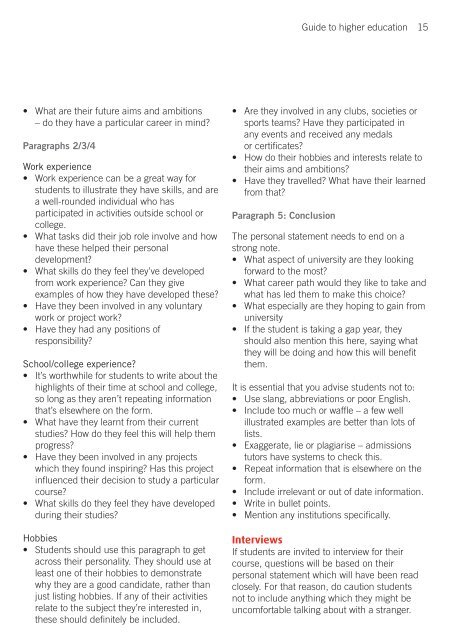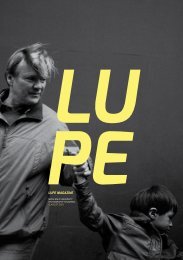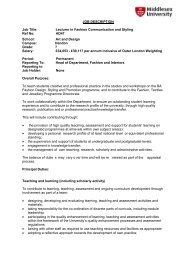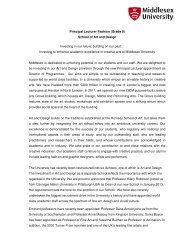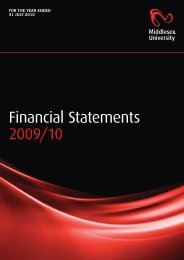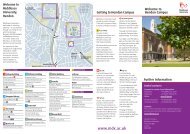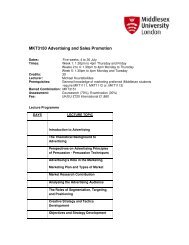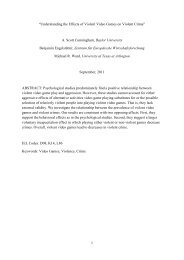Contact us: - Middlesex University
Contact us: - Middlesex University
Contact us: - Middlesex University
You also want an ePaper? Increase the reach of your titles
YUMPU automatically turns print PDFs into web optimized ePapers that Google loves.
Guide to higher education 15<br />
• What are their future aims and ambitions<br />
– do they have a particular career in mind?<br />
Paragraphs 2/3/4<br />
Work experience<br />
• Work experience can be a great way for<br />
students to ill<strong>us</strong>trate they have skills, and are<br />
a well-rounded individual who has<br />
participated in activities outside school or<br />
college.<br />
• What tasks did their job role involve and how<br />
have these helped their personal<br />
development?<br />
• What skills do they feel they’ve developed<br />
from work experience? Can they give<br />
examples of how they have developed these?<br />
• Have they been involved in any voluntary<br />
work or project work?<br />
• Have they had any positions of<br />
responsibility?<br />
School/college experience?<br />
• It’s worthwhile for students to write about the<br />
highlights of their time at school and college,<br />
so long as they aren’t repeating information<br />
that’s elsewhere on the form.<br />
• What have they learnt from their current<br />
studies? How do they feel this will help them<br />
progress?<br />
• Have they been involved in any projects<br />
which they found inspiring? Has this project<br />
influenced their decision to study a particular<br />
course?<br />
• What skills do they feel they have developed<br />
during their studies?<br />
Hobbies<br />
• Students should <strong>us</strong>e this paragraph to get<br />
across their personality. They should <strong>us</strong>e at<br />
least one of their hobbies to demonstrate<br />
why they are a good candidate, rather than<br />
j<strong>us</strong>t listing hobbies. If any of their activities<br />
relate to the subject they’re interested in,<br />
these should definitely be included.<br />
• Are they involved in any clubs, societies or<br />
sports teams? Have they participated in<br />
any events and received any medals<br />
or certificates?<br />
• How do their hobbies and interests relate to<br />
their aims and ambitions?<br />
• Have they travelled? What have their learned<br />
from that?<br />
Paragraph 5: Concl<strong>us</strong>ion<br />
The personal statement needs to end on a<br />
strong note.<br />
• What aspect of university are they looking<br />
forward to the most?<br />
• What career path would they like to take and<br />
what has led them to make this choice?<br />
• What especially are they hoping to gain from<br />
university<br />
• If the student is taking a gap year, they<br />
should also mention this here, saying what<br />
they will be doing and how this will benefit<br />
them.<br />
It is essential that you advise students not to:<br />
• Use slang, abbreviations or poor English.<br />
• Include too much or waffle – a few well<br />
ill<strong>us</strong>trated examples are better than lots of<br />
lists.<br />
• Exaggerate, lie or plagiarise – admissions<br />
tutors have systems to check this.<br />
• Repeat information that is elsewhere on the<br />
form.<br />
• Include irrelevant or out of date information.<br />
• Write in bullet points.<br />
• Mention any institutions specifically.<br />
Interviews<br />
If students are invited to interview for their<br />
course, questions will be based on their<br />
personal statement which will have been read<br />
closely. For that reason, do caution students<br />
not to include anything which they might be<br />
uncomfortable talking about with a stranger.


